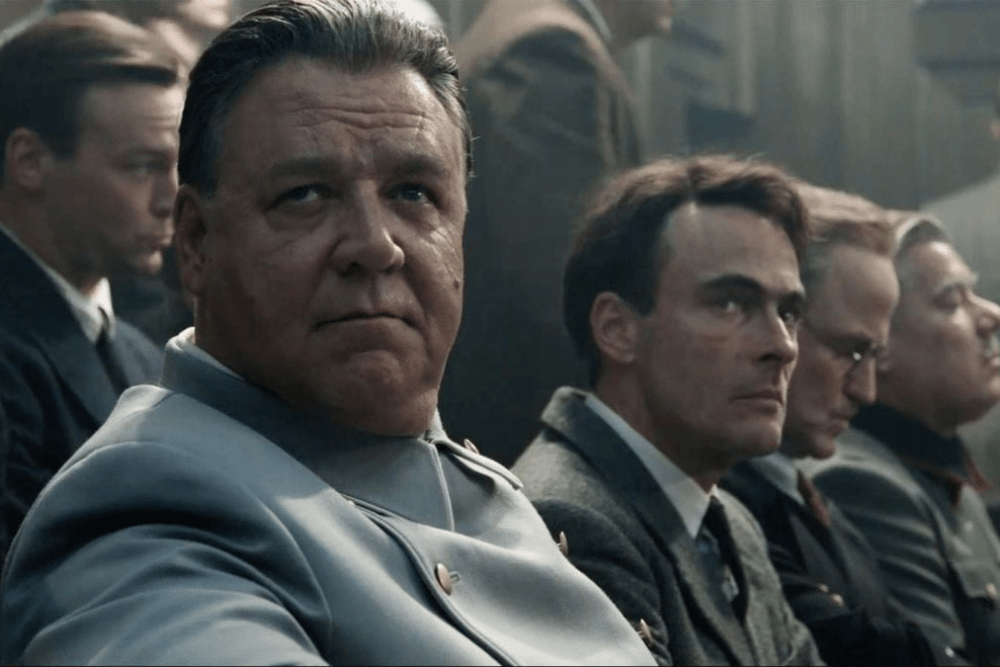It is said there is only one rule when it comes to dramatising the Holocaust: don’t. The argument is essentially this: the unique horror of the event is beyond the scope of conventional artistic representation. Illuminate what happened with a documentary, sure, but apply a glossy Hollywood sheen to those monstrous events and you risk artistic catastrophe.
I’ve seen many productions which fall into that category but here’s two recent ones: Hunters, an Al Pacino series for Amazon which portrays a gang of 1970s New York Nazi hunters as superhero vigilantes, and Sky Atlantic’s tastefully shot The Tattooist of Auschwitz, a sentimental, semi-fictionalised (why? Is the truth not enough?) account of a concentration camp love story. Coming soon, I fear: The Dry Cleaner of Buchenwald, The Loss Adjuster of Bergen-Belsen and The Ladies Hairdresser of Dachau.
My hopes weren’t high, then, when I sat down last Friday to watch Nuremberg, a big budget Hollywood film starring Russell Crowe as Hermann Goering. Even so, nothing could prepare me for the obscenely ill-judged two hours that followed.
Where to start? In no particular order, here are what, for me, were just some of its egregious errors of taste, decency and judgement:
- A grossly invasive, inappropriately lush orchestral soundtrack played throughout in an attempt to manipulate – no, bludgeon – us into feeling something. Because, of course, an unaccompanied telling of the story of the murder of six million Jews is not enough, on its own, to make us feel.
- The use of several minutes of black and white news reel footage of the Holocaust, halfway through the stagey, lushly colourised movie. One sequence showed vast mounds of emaciated dead bodies being shoved into a crater in the ground by a bulldozer. This real life, jarringly juxtaposed footage made an all-too-real story feel totally unreal, which is quite some achievement.
- The sub-Dynasty style soap dialogue. For example: ‘Ah’m gonna put Hermann Goering on the stand and ah’m gonna make him tell the world what he did!’ A story like this, ideally, demands a respect for the facts, a verbatim approach where possible and a sober, low-key dynamic. The more you amp it up, the more grotesque it potentially becomes.
- The heavy handed MAGA references. Near the end of the film someone says – or rather shouts – something like: ‘EVIL DOESN’T HAVE TO WEAR A UNIFORM FOR YOU TO KNOW IT’S EVIL!’ Yes, Trump has his flaws. But comparing his administration with the Third Reich is, as even his enemies would surely acknowledge, moronically reductive.
- The ‘Allo ‘Allo! style accents. (E.g. Goering: ‘I em going to es-cape zee hengmen’s noose!’ If only the director had followed the example of Kenneth Branagh’s Conspiracy, about the 1942 Wannsee conference, when Nazi officials discussed details of the Final Solution. Branagh, wisely, told the actors to use English accents as he feared that giving it loads of ‘zis’ and ‘zat’ would be distracting. As a result the film worked well. It became relatable, bureaucratic and, as Hannah Arendt might have said, chillingly banal.
It is possible to make a good film that illuminates the Holocaust without being offensive: The Zone of Interest, for example. It passed muster because it said a lot by – crucially – showing very little. The whole thing took place in a house next to Auschwitz and we saw no horrors, although we did hear the constant mechanised background hum of industrialised slaughter. The only film set inside a camp which does justice (whatever that means) to the subject is the 2015 Hungarian feature Son of Saul, set in Auschwitz. It is, to my knowledge, the only Holocaust drama which has received near universal praise from audiences, critics and Jewish organisations alike.
It may be that I am getting too discerning, too overly critical, in my old age: I’m in my 60s and I’ve seen a lot of stuff. Had I seen Nuremberg 30 years ago, who knows? I might have been impressed by the over-the-top sledgehammer approach. I thought Schindler’s List was great when I first saw it. I don’t know what I would make of it now.
I’m an ethnic Jew, which may be relevant. Then again, a friend of mine, one of our greatest ever satirists, texted me after seeing the film, calling it: ‘an insult to everybody and everything… pornographically vengeful.’ And he is as English as they come.
The headline to this article says the film is almost unforgivable. Why ‘almost’? Well, its one saving grace is that it keeps the story alive. It will educate those who need to be educated. And that, for all its myriad artistic sins, is what stops it being totally unforgivable.






Comments